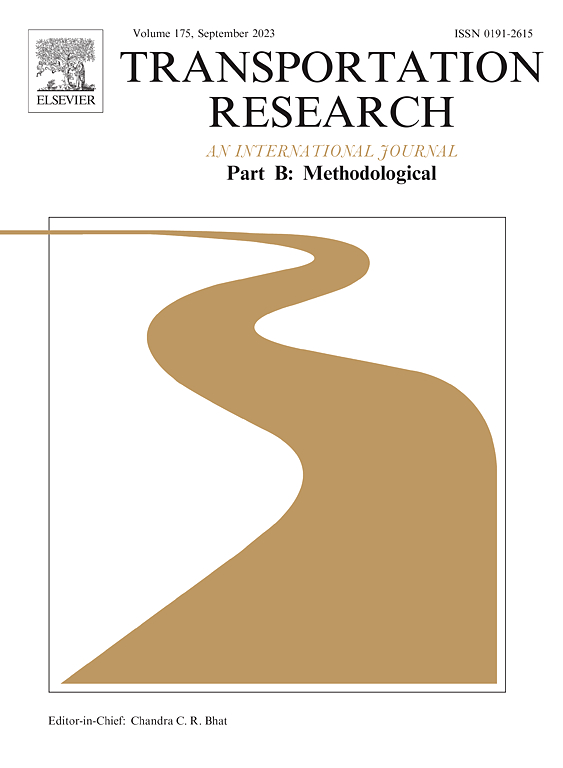Estimation of schedule preference and crowding perception in urban rail corridor commuting: An inverse optimization method
IF 5.8
1区 工程技术
Q1 ECONOMICS
引用次数: 0
Abstract
This paper introduces an inverse optimization method to uncover commuters’ schedule preference and crowding perception based on aggregated observations from smart card data for an urban rail corridor system. The assessment of time-of-use preferences typically involves the use of econometric models of discrete choice based on detailed travel survey data. However, discrete choice models often struggle with potential endogeneity issues in behavioral observations when estimating individual samples from massive transit data with limited exogenous identifying information. This motivates us to employ an equilibrium modeling approach to capture the dynamism hidden in commuters’ departure time decision-making from aggregations. Assuming user optimality in observed choices, an inverse optimization method is proposed to find a set of preference parameters in the stochastic user equilibrium-based morning commuting model with heterogeneous commuters so that the resulting equilibrium pattern best approximates the observed departure rate distribution over time. The proposed inverse optimization problem can be formulated by a bi-level programming model and a sensitivity analysis-based solution framework is further designed for model estimation. Lastly, the smart card data and train timetable data from the rail corridor along the Beijing Subway Batong Line are synthesized for a case study to estimate commuters’ departure time choice preferences during morning peak periods, as well as to validate the robustness and practicality of the proposed method.
城市轨道交通走廊通勤中的班次偏好和拥挤感估计:一种反向优化方法
本文介绍了一种反向优化方法,根据智能卡数据对城市轨道交通走廊系统的综合观测结果,揭示乘客的时间偏好和拥挤感。对时间使用偏好的评估通常涉及使用基于详细旅行调查数据的离散选择计量经济学模型。然而,离散选择模型在对外源性识别信息有限的海量交通数据中的个体样本进行估算时,往往难以解决行为观测中潜在的内生性问题。这促使我们采用一种均衡建模方法,从集合中捕捉隐藏在乘客出发时间决策中的动态性。假定用户在观察到的选择中是最优的,我们提出了一种反向优化方法,在基于随机用户均衡的异质通勤者早晨通勤模型中找到一组偏好参数,从而使得到的均衡模式最接近观察到的出发率随时间的分布。所提出的逆向优化问题可以用双层程序模型来表述,并进一步设计了一个基于灵敏度分析的求解框架,用于模型估计。最后,综合北京地铁八通线沿线轨道走廊的智能卡数据和列车时刻表数据进行案例研究,以估计早高峰期间乘客的发车时间选择偏好,并验证所提方法的稳健性和实用性。
本文章由计算机程序翻译,如有差异,请以英文原文为准。
求助全文
约1分钟内获得全文
求助全文
来源期刊
CiteScore
12.40
自引率
8.80%
发文量
143
审稿时长
14.1 weeks
期刊介绍:
Transportation Research: Part B publishes papers on all methodological aspects of the subject, particularly those that require mathematical analysis. The general theme of the journal is the development and solution of problems that are adequately motivated to deal with important aspects of the design and/or analysis of transportation systems. Areas covered include: traffic flow; design and analysis of transportation networks; control and scheduling; optimization; queuing theory; logistics; supply chains; development and application of statistical, econometric and mathematical models to address transportation problems; cost models; pricing and/or investment; traveler or shipper behavior; cost-benefit methodologies.

 求助内容:
求助内容: 应助结果提醒方式:
应助结果提醒方式:


